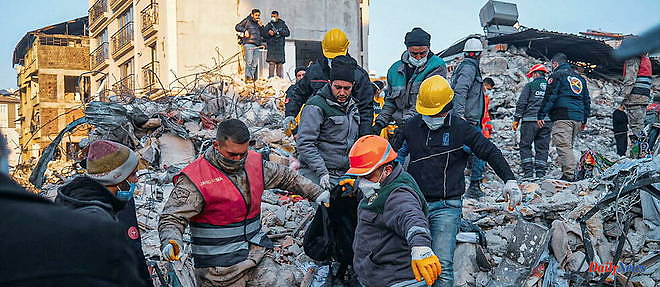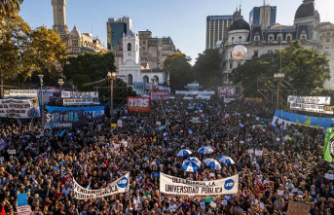This is one of the main issues generated by the powerful earthquake that struck Turkey and Syria in early February. In the rubble and rubble, hundreds of thousands of homeless people still face hunger and cold in the two bordering countries. Authorities are now trying to mitigate the humanitarian disaster, which has claimed more than 35,000 lives.
While the chances of finding survivors are almost nil, the priority now is to help the hundreds of thousands of people whose homes were destroyed by the earthquake. According to the Turkish government, some 1.2 million people have been housed in student residences, more than 206,000 tents have been erected and 400,000 victims evacuated from the devastated areas.
In Antakya, the Antioch of Greek Antiquity, after the first three or four days of abandonment, relief is now organized, according to journalists from Agence France-Presse on the spot. Basic toilets were installed, to the great relief of the survivors who were deprived of them for several days, and the telephone network was restored in part of the city. A strong police and military presence was visible to prevent looting, after several incidents over the weekend.
Many residents interviewed by Agence France-Presse, however, justified the thefts from supermarkets in the early days by the state of absolute necessity in which many found themselves, without water, electricity, money or open shops.
Added to extreme material deprivation is psychological distress, which hits the youngest hardest. Turkish Vice President Fuat Oktay said 574 children extracted from the collapsed buildings were found unaccompanied.
"My children were badly affected by the earthquake," Serkan Tatoglu, whose wife and children aged six, 11, 14 and 15, have taken refuge in a village of tents pitched nearby, told Agence France-Presse. of the Kahramanmaras city stadium.
“I lost about ten members of my family. My children still don't know, but the youngest is traumatized by the aftershocks. She keeps asking "Dad, are we going to die?" “, he confides. "I don't want to show them the corpses. With my wife, we hug them and tell them “everything will be fine”, continues Serkan Tatoglu
Glimmer of hope, new survivors have been pulled from the rubble well beyond the crucial 72-hour period after the disaster. In the night from Sunday to Monday, seven people were released alive in Turkey, according to the press, including a three-year-old child in Kahramanmaras and a 60-year-old woman in Besni.
Another, 40, was also rescued after 170 hours in Gaziantep. Another heartwarming episode: in Kahramanmaras, a journalist from Agence France-Presse saw rescuers find a dog alive under the rubble on Monday. But the toll of the 7.8 magnitude earthquake continues to grow and could even double according to the UN: it amounted to 35,331 dead on Monday evening - 31,643 dead in southern Turkey, according to the 'Afad, a Turkish public disaster management body, while authorities have counted 3,688 dead in Syria.
"72,663 people may have lost their lives and 193,399 people may be injured," according to a report by employers' association Turkonfed published by Turkish media on Monday. The economic cost of the earthquake could reach "84.1 billion dollars", indicates the same source.
Syria, for its part, announced the opening, for an initial period of three months, of two new crossing points with Turkey to speed up the arrival of humanitarian aid. Before the earthquake, almost all the aid, crucial for more than 4 million people living in the rebel areas of northwestern Syria, was channeled from Turkey through a single border crossing, that of Bab al-Hawa.
Calls to open new crossing points between Turkey and northwestern Syria, some areas of which are controlled by the rebellion, had multiplied in recent days. UN Secretary-General Antonio Guterres hailed Syrian President Bashar al-Assad's move, which "will allow more aid to come in, faster".
Trucks, with on board enough to make shelters using plastic sheeting, as well as blankets, mattresses, ropes or even screws and nails, crossed the border on Monday. According to Syrian Transport Ministry official Suleiman Khalil, 62 planes loaded with aid have so far landed in Syria and more are expected in the coming hours and days, particularly from Saudi Arabia.












